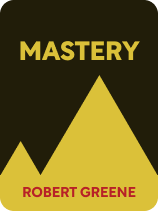

This article is an excerpt from the Shortform book guide to "Mastery" by Robert Greene. Shortform has the world's best summaries and analyses of books you should be reading.
Like this article? Sign up for a free trial here .
What are the principles put forth in the book Mastery? What can you apply to your life to become a master in your field?
Mastery is a self-help guide that describes the path to intellectual and creative excellence. Robert Greene explains how to achieve such mastery in three stages, and he argues that pursuing it yields a fulfilling life and great creative power.
Here’s an overview of Mastery by Greene.
Mastery by Robert Greene
Greene is a bestselling author known for The 48 Laws of Power, his guide to power dynamics and social dominance. In 2012, he wrote Mastery to explain creative excellence and chart a clear course for anyone to reach it. Our guide explains Mastery by Greene in four parts:
- Greene’s definition of mastery—what it entails and how to achieve it
- Foundational training—how to build a solid foundation of knowledge and skills
- Creative independence—how to find your creative direction and experiment with ideas
- Mastery—how to continue working and growing until you attain holistic, intuitive virtuosity in your field
Mastery Is Creative Power
Greene first explains that mastery is the highest level of creative excellence, and it means that you’ve fully grasped your discipline or field.
Masters are experts who make breakthrough discoveries, innovate new forms of art, or shift the paradigm in their fields. For example, William Shakespeare masterfully shaped English literature through his now-acclaimed playwriting, poetry, and innovative uses of prose and narrative.
According to Greene, mastery has two components: technical proficiency and social know-how.
Component #1: Technical proficiency. Greene says that thoroughly grasping the established skills and knowledge of your field enables you to break new ground. In other words, technical proficiency lets you explore the limits of your field, break conventions, and experiment with new forms, methods, and ideas. Think of how jazz musicians start with established music and then experiment to create unique styles.
Component #2: Social know-how. Greene argues that since other people can make or break your career, a “true” master learns how to read, understand, and make use of people. He uses social know-how to gain supporters, defuse conflicts, and navigate to the top of his field. Without this skill set, Greene asserts that you can’t maintain your position long enough to reach mastery.
Three Stages to the Process
Attaining mastery is a lifelong process of growth and discovery. Throughout life, the master continually expands her horizons by challenging her set habits and assumptions, and she always pursues what makes her feel most alive.
Greene explains that you can develop mastery by following three stages:
- Stage #1: Foundational training. Starting out in your field, you need to learn the ropes. Commit to working hard and you’ll gradually become adept at your field’s basic skills and gain a feeling for its social dynamics.
- Stage #2: Creative independence. With some experience under your belt, you can begin to pursue what interests you most. You’ll exercise your creative voice and gain attention—critical and supportive—for your work.
- Stage #3: Mastery. Having committed long years to your discipline, you’ve developed sophisticated knowledge and skills. You’ve risen to the top by setting your own standards and pursuing them, and you now have high-level creative power that enables you to push boundaries and comprehensively understand the state of your field.
Find Your Calling
Greene explains that throughout history, masters have referred to an inner force that guided their work. Whatever we call it, we all have this sense of direction within us. It’s why you feel drawn to some things but not others—music or math, academia or entrepreneurship.
By acting according to your inner sense of direction, you’ll develop your creative potential and strive toward mastery. According to Greene, everything will naturally fall into place as you follow that inner force.
Stage #1: Foundational Training
Having established a connection to your inner voice and committed to acting in accord with it, it’s time to pursue your foundational training. Greene explains that all masters undergo a rigorous, self-directed practical education after finishing conventional education in school, which teaches mostly theory.
Task #1: Learn the Ropes
Greene explains that in any career field, there are existing rules, norms, and conventions that people follow. Learn these to ensure you can navigate your field and avoid offending people’s sensibilities.
Task #2: Develop Your Skills
Alongside your observation, begin to train your technical abilities. Every field has its skills, and you’ll need technical proficiency to achieve mastery. Greene recommends starting with one skill that underpins others in your field. For example, an aspiring novelist could learn to brainstorm and organize her thoughts before trying more complex aspects of creative writing.
Task #3: Test Your Progress
Once you’ve acclimated to your field and built your skills, Greene recommends seeking feedback by demonstrating what you’ve learned. To do this, take on some responsibility at work—such as a project or an initiative with which you can test your progress.
Become Socially Adept
In addition to a practical education, Greene argues that “true” mastery requires social know-how. This is because other people can make or break your career trajectory.
Learn to Read People
Greene suggests that a key element of social know-how is developing a realistic perspective of human nature and discarding any social naivete left over from childhood. He argues that people probably aren’t as good as you think, and he recommends that you avoid trying to change them. Instead, learn to work with them or make use of them.
Find a Mentor
While self-directed learning can take you far, Greene asserts that finding a mentor will accelerate and enrich your learning. Attract a mentor by appealing to her self-interest: According to Greene, mentors are often busy and won’t mentor just anyone. Demonstrate that you’ll do unglamorous work—such as organizational and administrative tasks—and that you have discipline and drive.
Stage #2: Creative Independence
Once you’ve completed your foundational training, it’s time to step out into the world. In this section, we’ll explain the second stage of mastery: creative independence.
To achieve creative independence, Greene advises that you avoid becoming rigid. After years of foundational training, you might settle into learned conventions and familiar ways of thinking that reduce your creativity. Prevent this stagnation by taking the three steps to cultivate a creative mind: Commit to a creative project, pursue it to fruition, and persist through emotional obstacles.
Cultivate a Creative Mind
According to Greene, achieving creative independence requires you to develop a certain kind of mind—a flexible, explorative mind that combines childlike wonder with the experience and skills from your foundational training.
Commit to a Creative Project
The first step in cultivating a creative mind is to commit to a creative project. Any master has a project that calls to them. Find what you’re naturally drawn to in your field—a project you feel like you’re meant for—by listening to your inner sense of direction. Feeling deeply connected to the project helps you stay committed when things get tough.
Keep Your Mind Flexible
As you pursue your project, practice stretching your mind to remain creative. According to Greene, our minds naturally tighten up over time—that is, we settle into certain ways of thinking. However, sticking with what you know isn’t creativity.
Create a Major Insight
According to Greene, past masters all reached their highest achievements by pushing through intense creative tension and, ultimately, letting go to allow the solutions to arise. This process of working through a peak of tension, Greene says, is what led masters like Einstein—who allegedly gave up on his project just before finding the solution—to do their greatest works.
Overcome Emotional Obstacles
As Greene explains, performing creative work in a public arena means you’ll come under scrutiny. Self-doubt and inner tension are part and parcel of the creative life, and you can navigate them by watching for the following traps: cynicism, self-importance, dependence, mental rigidity, and impatience.
Stage #3: Mastery
After spending years developing your creative independence, you’ll eventually achieve mastery. According to Greene, mastery comes about when you merge rational thinking with sophisticated intuition—using your experience and learned skills as well as your openness and intuition to explore novel ideas and thoroughly work them out.
Masters Have Intuition
When you study a field or skill for a long time, you develop an intuitive feel for it—gaining “instincts” for math, art, or writing. With that intuition, you can make quick, accurate judgments and freely explore the environment in which you think, work, and create.
While her insights come from this well-developed intuition, the master also uses reason to work them out. Greene writes that coming to the insight is the first step—validating it is the second.
Masters See the “Flow” of Their Fields
Greene argues that with high-level intuition and reason, a master grasps her field as a whole, and she becomes attuned to its “dynamic.” In other words, she sees how the parts fit together and flow as one whole, and she intuitively senses the dynamic, evolving form of it all.
Mastery Is a Lifelong Journey
Greene explains that time and effort inevitably yield mastery—he asserts that it takes around 20,000 hours. In other words, you’ll get there guaranteed if you put in the hours.
However, the time you spend developing mastery must be intense and committed. You can’t just go through the motions, because half-hearted practice yields half-hearted results. Show up with vigor and verve, putting everything you’ve got into your work and taking every opportunity to learn, and you’ll reap far fuller rewards.

———End of Preview———
Like what you just read? Read the rest of the world's best book summary and analysis of Robert Greene's "Mastery" at Shortform .
Here's what you'll find in our full Mastery summary :
- The clear path anyone can follow to achieve mastery
- An explanation of the three stages of mastery
- How learned conventions and familiar ways of thinking reduce creativity






